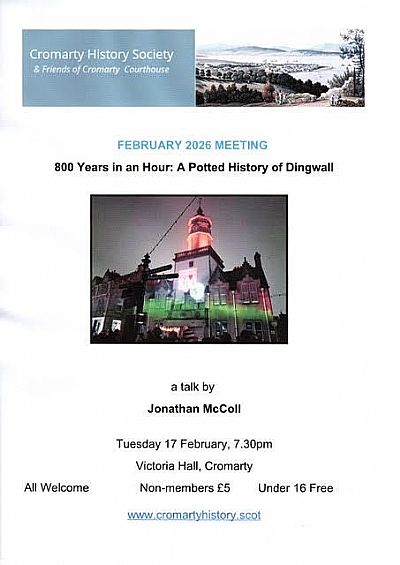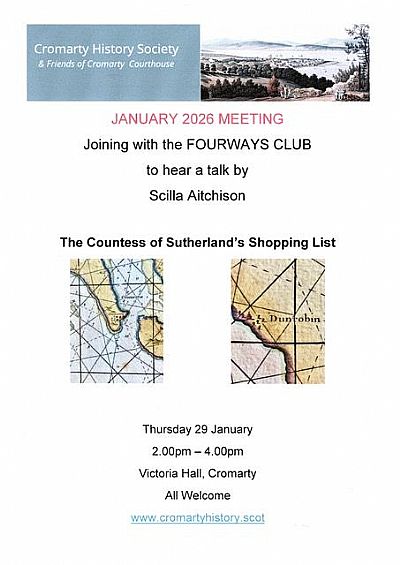04 February 2026Meeting Tuesday 17 February

500 Years in an Hour: A Potted History of Dingwall
Jonathan McColl
Victoria Hall, Cromarty
Cromarty History Society’s next talk will be by Jonathan McColl on February 17th 2026 at 7.30pm in the Victoria Hall, Cromarty and will be followed as usual by refreshments. Visitors are £5 and under 16s are free.
Jonathan McColl has lived in Dingwall for forty years and is starting to get to know it. Back in the days he taught people how to use Microsoft Office apps. He found that work interfered with his history‐related hobbies but that is no longer the case. He is the current Chair of Dingwall Museum, a guide in Castle Leod, gives history street walks, and is prepared to chat with anyone about old stuff if they hold still long enough.
The talk “800 Years in an Hour — A Potted History of Dingwall” is what it says on the tin, a burgh story that works in with this year’s ‘Dingwall 800’ events in the town celebrating the first Royal Charter given to the place by King Alexander II that long ago.
17 January 2026Courthouse Recruitment 2026

15 January 2026Meeting Thursday 29th January

Scilla Aitchison
Victoria Hall, Cromarty
Cromarty History Society
Cromarty History Society’s January meeting will be a little different as it will be in the afternoon and we will be joined by members of Cromarty’s Fourways Club and concerns an 18th century Countess of Sutherland’s Shopping List.
The date is January 29th 2026 , time 2‐4pm at the Victoria Hall in Cromarty. There will be no charge for the meeting but there will be a donations box for the Courthouse Museum.
Speaker Scilla Aitchison’s favourite childhood spot was the library and her student holiday job was always in a library. When she graduated she was hired as a university librarian and then became an archivist in the Science Museum in London before being offered a post as a librarian in the House of Commons. When her children were young she worked from home for publishers, wrote articles and edited a history magazine. Since returning to the North she has carried out genealogical research for many of the Highland Diaspora across the globe.
The subject of her talk began when she found an unusual old map in an antique shop in Cromarty featuring her two favourite places in the Highlands which led to research in the National Library in Edinburgh and to this talk.

